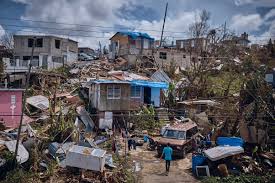Puerto Rico, after suffering two devastating hurricanes, is almost entirely obliterated. Some parts of the island will be without electricity for months, and for a vast majority of the population, food and water are scarce. As a result, many Puerto Rican citizens are searching for a way to leave the island and travel to friends or family in areas of the mainland United States.
In Balzac vs. People of Porto Rico, The Supreme Court unanimously ruled that Puerto Ricans have the ability to become “residents of any State there to enjoy every right of any other citizen of the United States, civil, social and political.” As citizens of the island are likewise citizens of the United States, they have the constitutional right to travel. However, not only does the potential mass emigration from Puerto Rico pose major problems for the island itself, but the mainland United States must also prepare to support the throngs of new arrivals, many of whom are without money, housing, or health care.
Massachusett has the fifth largest population of Puerto Ricans of any state in the U.S. Provided that Puerto Ricans are able to escape from their land, this ranking could very likely increase. Already, in areas of Western Massachusetts such as Springfield and Holyoke, the Puerto Rican population is growing. Schools in the state are preparing for the expected incursion of students from the destroyed island.
Immediately following the arrival of Hurricane Maria on September 20, 2017, the Department of Elementary and Secondary Education alerted school district leaders to the likelihood of large groups of new students. Massachusetts schools are prepared to welcome the students. However, these children will have little information about their education, including their grades and the information that they have already covered. Therefore, schools must figure out how to sort the students into appropriate and suitable programs.
The federal McKinney-Vento Act requires that school districts must accommodate homeless children (children staying at a relative or friend’s home rather than their own) regardless of whether or not they have documentation verifying their age or grade. To prepare for new groups of Puerto Rican students, schools must act quickly. In addition to placing the students in the correct classes, school officials must connect them with free meals and help them move past the inevitable language barrier. This will likely include adding resources to English language learner programs. Schools may not have the resources they need to quickly and effectively accommodate the new influx of foreign students. However, non-profit organizations are reacting as well. The Massachusetts United for Puerto Rico Fund has raised over 1.3 million dollars in donations, some of which will support Puerto Rican families moving to Massachusetts. This will help the families obtain housing, medical care, and education, along with lessening the burden on Massachusetts schools. In the months ahead, the state of Massachusetts will be working quickly in order to help former inhabitants of Puerto Rico.

